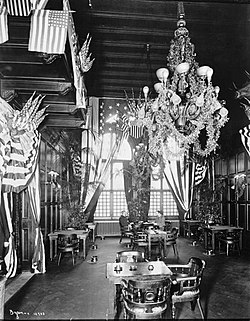| Jerome Mansion | |
|---|---|
 The Jerome Mansion, torn down in 1967 | |
 | |
| General information | |
| Location | 32 East 26th Street, Manhattan, New York City |
| Coordinates | 40°44′33″N73°59′11″W / 40.7424°N 73.9863°W |
| Construction started | 1859 |
| Completed | 1865 |
| Demolished | 1967 |
| Cost | US$200,000 |
| Owner | Leonard Jerome |
| Design and construction | |
| Architect(s) | Thomas R. Jackson |
| References | |
| [1] | |

The Jerome Mansion was a mansion on the corner of East 26th Street and Madison Avenue, across from Madison Square Park, in the modern NoMad neighborhood of Manhattan in New York City. It was the home of financier Leonard Jerome, one of the city's richest and most influential men in the middle- to late-19th century. [2] It was built from 1859 to 1865 and demolished in 1967. [1]